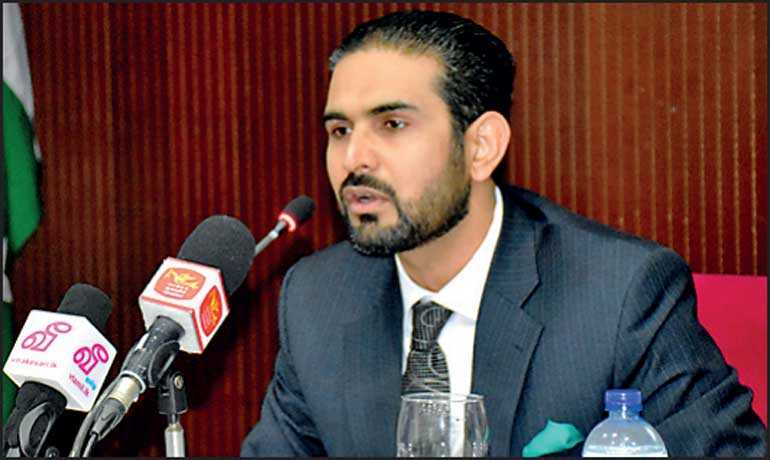Wednesday Feb 18, 2026
Wednesday Feb 18, 2026
Tuesday, 29 October 2019 00:00 - - {{hitsCtrl.values.hits}}



The High Commission of Pakistan, in collaboration with the Kashmir Study Forum, Sri Lanka organised a seminar to mark Kashmir Black Day on 27 October at BMICH, Colombo.
The seminar was addressed by, Kashmir Study Forum Chairman Jamal ud Din as well as senior analyst Latheef Farook with the view to highlight Indian atrocities in the State of Jammu and Kashmir. A documentary highlighting the atrocities of Indian forces and their inhumane treatment of the innocent Kashmiris was also screened on the occasion.
Acting High Commissioner of Pakistan Tanvir Ahmad, while welcoming the guests, paid homage to the people of Jammu and Kashmir for their just struggle against the decades-long Indian illegal occupation of Jammu and Kashmir, and reiterated Pakistan’s moral, political, and diplomatic support for the people of Kashmir in their right to self-determination. He further highlighted that since 5 August, the scale and impunity of the Indian Government’s human rights violations have increased several-fold. Through the deployment of additional troops and an unprecedented media and communication blackout, which has continued for almost three months, Indian-occupied Jammu and Kashmir (IOJ&K) has been turned into the largest prison on the planet. Referring to the United Nations Security Council’s special session on the Kashmir issue, he said that the international community is no more a silent spectator to the Indian atrocities. Explaining the purpose of the seminar, he said that it was to draw attention towards the miseries of the Kashmiri people and to stress the urgency of resolving the Kashmir dispute in accordance with the aspirations of Kashmiri people under the auspices of UNSC resolutions.
Senior Analyst Latheef Farook, speaking on the occasion, said Kashmir is a source of long-standing dispute between Pakistan and India, which originated when the people of Jammu and Kashmir were denied the right of self-determination in 1947. He underscored that when India and Pakistan became independent on August 1947, it was generally assumed that Kashmir, as a contiguous state with a predominantly Muslim population, would accede to Pakistan. Its ruler, the Maharaja, however, on 27 October 1947 acceded to India through an improper and illegal Instrument of Accession. On the same day, India airlifted its forces to Srinagar and occupied the valley.
Kashmir Study Forum Sri Lanka Chairman Jamal ud Din, in his concluding remarks decried the human rights violations committed by the Indian armed forces in occupied Kashmir for the past seven decades. He said that the world community was under moral obligation to ensure a United Nations sponsored plebiscite in Kashmir according to the wishes of the Kashmiri people. He recalled that the Kashmir issue was first brought to the UN by India; however, India has been reluctant to implement UNSC resolutions for the past 72 years.
Comprehensive discussion was held during the seminar, urging the Indian Government to immediately lift the curfew and communications blackout as well as rescinding of its illegal and unilateral actions in the occupied territory since 5 August after abrogation of Article 370 and 35A.
The seminar was attended by a large number of people from different walks of life including academicians, journalists, writers, local friends of Kashmir as well as the Pakistani community.